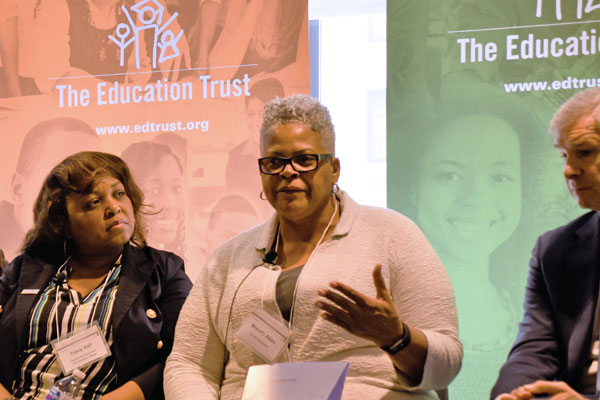- Posted in All University
- Category: Campus News
LINCOLN UNIVERSITY, Pa. – Speaking at a higher education event in Washington, D.C., yesterday, Lincoln University President Brenda A. Allen called on education to “evolve its practices” in order to continue to drive social mobility for students of color and students from low income families.
“We have to acknowledge that the positive effects of social mobility are being challenged today.”

Lincoln University President Brenda A. Allen (center) speaks at an education event in Washington, D.C. on June 25, 2019. Also pictured is Southwest Tennessee Community College President Tracy Hall and Georgia State University President Mark Becker. (Courtesy photo/Jack Fleming)
Allen joined other college leaders, researchers, students, and higher education policy makers and influencers from organizations such as the Brookings, Lehman College (CUNY), the American Council on Education, Georgia State University, and Pace University for a fast-paced, interactive event that combined short talks, big ideas, and breakout sessions.
“Social mobility remains an area of great racial disparity in this country,” Allen wrote in a prepared paper for the event. “Education has the potential to lessen the gap, if and only if it focuses on training individuals to thrive in today’s marketplace.”
“A liberal arts education continues to be the most powerful educational approach toward developing strong intellect and interpersonal savvy. The liberal arts’ use of curricular and co-curricular opportunities as vehicles for honing important skills such as writing and problem-solving along with developing interpersonal skills like leadership, ethics and teamwork will surely produce graduates able to thrive in today’s economy, thusly insuring long-term success.”
Attendees at the event, titled “How Colleges Can Drive Social Mobility for Students of Color and Students from Low-Income Families,” identified the barriers that students and their colleges face when trying to climb the economic ladder with the help of higher education.
The event was hosted by the TIAA Institute and The Education Trust, a national nonprofit that works to close opportunity gaps that disproportionately affect students of color and students from low-income families.
Article by Shelley Mix, Office of Communications & Public Relations.